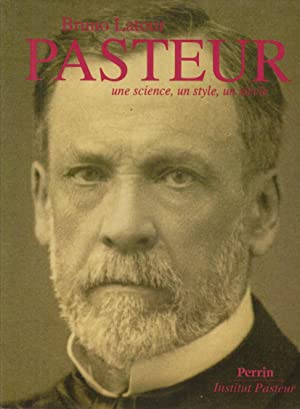
December 02, 2022
Bulletin interne de l'Institut Pasteur


Save the date – come and choose your book for the bicentenary
The year 2022 has seen a host of memorable events to mark the bicentenary of Louis Pasteur's birth, including exhibitions, conferences, dedicated scientific awards, book publications and a special staff day to celebrate Team Pasteur and the Institut Pasteur's founder.
To bring this special year to a close, we would remind you that a further event will be held in December. The Institut Pasteur is delighted to offer all staff (employees, OREX, interns and visiting scientists) a copy of their choice of one of the following books:
Pasteur, l'homme et le savant (Pasteur, the man and the scientist), by Annick Perrot and Maxime Schwartz, published by Editions Tallandier
Summary:
 There can be no doubt that Pasteur (1822-1895) is the most famous of France's scientists. But what do we actually know about him and his achievements, apart from the fact that he invented the rabies vaccine and pasteurization? What about his many other discoveries, which revolutionized not only science but also our daily lives? Did you know that he had a stroke at the age of 46 and was partially paralyzed when he carried out his most famous work? That he dispatched his nephew to wage a bacteriological war against rabbits in Australia? That he predicted the emergence of epidemics like COVID-19? That his grandson was a great friend of Charles de Gaulle? And who was the father, the husband, the friend behind the illustrious scientist? What do we know about his innermost beliefs?
There can be no doubt that Pasteur (1822-1895) is the most famous of France's scientists. But what do we actually know about him and his achievements, apart from the fact that he invented the rabies vaccine and pasteurization? What about his many other discoveries, which revolutionized not only science but also our daily lives? Did you know that he had a stroke at the age of 46 and was partially paralyzed when he carried out his most famous work? That he dispatched his nephew to wage a bacteriological war against rabbits in Australia? That he predicted the emergence of epidemics like COVID-19? That his grandson was a great friend of Charles de Gaulle? And who was the father, the husband, the friend behind the illustrious scientist? What do we know about his innermost beliefs?
In this lavishly illustrated volume, Annick Perrot and Maxime Schwartz present the life and work of Louis Pasteur – the man behind the most significant scientific revolutions of the 19th century in the fields of biology, medicine, agriculture and hygiene – in a series of short, clear chapters. As we read about the trials and challenges he encountered throughout his life, we gain a better understanding of the man and the scientist.
• Pasteur, by Michel Morange, published by Editions Gallimard
Pour résumer :

While the subject of unlimited praise, Louis Pasteur was also a target of harsh criticism, particularly during the past decades. He is said to have been unfair towards his predecessors and collaborators, prepared to steal ideas from his competitors, greedy and overly ambitious – so much so that some people nowadays shun his celebrations. It was therefore high time to offer a more calm and balanced analysis, with an accurate description of Pasteur's achievements, but also highlighting the rather more difficult aspects of his personality.
By drawing on documents that have remained relatively unexplored, such as Louis Pasteur's laboratory notebooks, and paying more attention to his many writings and publications, we can gain new insight into his personality and achievements. Since the publication of the first biographies of Louis Pasteur, the practice of historical research has also changed profoundly, raising new questions that resonate with contemporary thinking.
These new documents and questions can offer new interpretations of several chapters of Pasteurian history. A biographical approach can also link the developments in his research with the context in which he worked.
Michel Morange, the book's author, commented: "When I embarked on this biography, I hoped to shed new light on Louis Pasteur based on a careful reading of all his writings, use of his laboratory notebooks and transformations in historical research. I soon came to the belief that a reinterpretation of certain episodes of his scientific life and sometimes even his behavior was possible, and would reveal a warmer and more human side to him. I leave it to the reader to judge!"
• Pasteur: une science, un style, un siècle (Pasteur: a science, a style, a century), by Bruno Latour, published by Editions Perrin
Summary:
 More than a century after his death, Louis Pasteur continues to inspire the same admiration as he did on the day of his state funeral, when people readily spoke of a "Pasteurian century."
More than a century after his death, Louis Pasteur continues to inspire the same admiration as he did on the day of his state funeral, when people readily spoke of a "Pasteurian century."
This album uses pictures and texts to give us a new perspective on Pasteur and to provide us with new reasons, often unexpected and profound, to admire his discoveries. Vinegar, beer, milk, silkworms, crystals, rabid dogs, sheep, pigs, children with animal bites, women in childbirth, sewers, water, air, fire – the whole of France seems to have spent time in Pasteur's laboratory at one point or another.
Rather than separating his scientific achievements from the rest of his life and the era in which he lived, this album explores the many links that Pasteur himself established between his research and the interests of those who followed its ups and downs, sometimes day after day.
The resurgence of deadly epidemics like AIDS and tuberculosis in our wealthy countries can give us a true understanding of the originality of Pasteur, a chemist who unwittingly became a physician, and the occasional misgivings of those who worked alongside him.

Photo : Institut Pasteur/François Gardy
Come along to module 3 beneath the staff restaurant on December 14 and 15 to receive a copy of your choice of one of these three books.
More details on how to collect your free book will follow in a future issue of the newsletter.
Make sure you save the date!